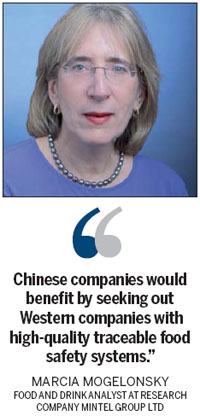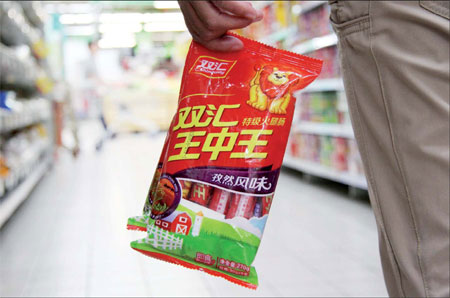It is meat and drink for them
Updated: 2013-10-11 09:54
By Lyu Chang and Qiu Bo (China Daily)
|
|||||||||||
Chinese companies eye more overseas mergers and acquisitions to offset rising safety concerns at home
Donna Wang is one of the many shoppers buying ham at a busy supermarket in downtown Shanghai. Unlike most of her peers who are scouring the shelves for reputed foreign brands, Wang prefers to buy ham made by the Chinese pork producer Shuanghui.
"My actions may seem rather strange," Wang says. "Food safety has become a matter of grave concern in China, especially after the recurrent scandals over contaminated products and substandard ingredients. As a result most of the shoppers prefer to shun local products and opt for foreign brands," Wang says.
As an old customer of Shuanghui, Wang feels that the brand does have the vital ingredients - trust factor and quality - needed to build confidence with customers.
The Chinese company has moved further up the quality ladder with its recent $7.1 billion purchase of US pork producer Smithfield Foods.
Many believe that the association with the US company, which has a reputation for high quality, will automatically make the Chinese company conform to international standards. "This also helps ensure the safety of the meat," Wang says.

Shoppers like Wang who are keen on quality as well as homegrown brands are now spurring Chinese food companies to shop overseas for modern production techniques, safety systems and reputed brands to cater to the growing demand.
Experts say that the Smithfield acquisition will help Shuanghui gain access to the brands perceived to be of higher quality and over the long term provide it with products for which China's burgeoning middle class are prepared to pay more, especially those that are made abroad.
Chinese food companies have for long sold products at low prices, but have now discovered that consumers are willing to spend more for products they believe are better or more prestigious, and are seeking to offer them everything from milk to bacon at premium prices, Vineet Sharma, head of consumer research at Barclays Capital's Asia (excluding Japan) division, commented in a recent interview to Wall Street Journal.
"Consumers aren't just looking at the cheapest brand, they want the better brand," said Sharma.
Global consultancy firm McKinsey & Co found in a recent survey covering 10,000 Chinese consumers that more than 80 percent of the respondents said they were spending more money on food than before, while a third of the respondents said they were buying more high end brands.
Xu Hang, a 30-year-old professional services employee, who has recently returned to China from Canada, says he has to buy huge quantities of milk powder for his family and friends every time he flies to Hong Kong for business.
"It is hard to trust domestic brands when it comes to food," he says. "The price of imported food is a bit higher, but it is also safer as it comes with the hallmark of quality."
In May, Mengniu Dairy Co, one of China's largest milk producers, struck a deal with French food products firm Danone to create a joint venture to expand yogurt production in a market where foreign brands are generally preferred. Oliver Barron, head of the Beijing branch of UK-based investment bank NSBO, says that more such deals are likely to be struck in the food sector between Chinese and foreign firms in the next few months.
These alliances, however, are not just about offering an up-scale range of products, experts say.
The fact that Shuanghui has decided to retain the US operations and brands, and also uphold safety standards, indicates that the deal is more about gaining access to technology and quality know-how.
"The deal will create a leading global animal protein enterprise," says Shuanghui chief executive Zhijun Yang.
"Shuanghui International and Smithfield have a long and consistent record of providing customers around the world with high-quality food, and we look forward to moving ahead together as one company."
Many safety scares in China have eroded trust among the middle class in domestic food products, ranging from pork to dairy products. In 2011, Shuanghui was allegedly found to be selling pork from pigs that had been fed banned additives, which made the pigs leaner but posed health risks to humans.
Melamine-tainted milk powder in 2008 that killed at least six children and sickened about 300,000 others, have further fueled consumers' concerns about the safety of domestic milk powder.
In response, the Chinese government called for efforts to make infant formula, milk, meat, vegetables, liquor and wine, as well as dietary supplement products traceable by building up a national electronic food-tracking system to boost food safety supervision.
Last year, in Jinan, capital of Shandong province, the Municipal Bureau of Commerce established a system for tracking pork, and the bureau uses a bar-code reader to track meat in more than 80 stores.
Marcia Mogelonsky, a food and drink analyst at London-based research company Mintel Group Ltd, says Chinese companies can learn best practices through acquisitions.
"There are many companies in the West that have processes to guarantee the safety of food processing from start to finish. Chinese companies would benefit by seeking out Western companies with high-quality traceable food safety systems," she says.
In Europe, for example, obtaining best practices and technologies is an important factor behind Shanghai-based Bright Food Group Co's acquisition of a 60 percent stake in British cereal maker Weetabix Ltd for more than $1 billion last year.
At the time of the acquisition, Bright Food's chairman, Wang Zongnan, said Weetabix's "best-in-class production standards and excellent record for innovation" should bring in long-term profits.
This kind of guarded optimism has opened doors for many of the recent Chinese acquisitions of foreign food makers, underlining the growing appetite of Chinese food companies for foreign mergers and acquisitions.
Purchases by Chinese buyers in the food sector included state-owned Cofco Corp's acquisition last year of Australian sugar producer Tully Sugar Ltd for $140 million and Bright Food (Group) Co's purchase in 2011 of Australian food producer and importer Manassen Foods Australia Pty Ltd for an estimated $522 million.
"Some Chinese companies have access to capital at very competitive rates," says Michael Swanson, the chief agricultural economist for Wells Fargo Bank, the largest agricultural lender in the US.
"They have decided that acquiring US assets represents a good and quick path to achieving the food safety they need," he says.
However from a strategic perspective, limiting inflation is likely to be the biggest driver for overseas acquisitions, Barron says.
With more money in their pockets, millions of Chinese are seeking richer diets and switching to meat such as pork, which is China's second-most important staple.
China's pork industry also produces and consumes about half of the world's pork and accounts for a significant chunk of the country's GDP.
Pork price swings are also a frequent source of consumer anxiety. Worries about the safety of pork supplies mounted earlier this year when 16,000 dead pigs were found floating in a river near Shanghai.
"Pork prices are the largest component in the CPI basket," Barron says. "There are legitimate fears that the current weak pork prices will reduce enthusiasm of pig farmers, leading to lower domestic pork supplies and higher prices over the next year."
According to China Customs statistics during the first six months of this year, China imported nearly 272,000 tons of pork valued at $510 million, up 0.3 percent year-on-year.
James O'Donnell, Asia manager of Bord Bia, the Irish Food Board, says that China plans to increase meat production by 85 million tons by 2015, an increase of 17 percent over the 2010 levels.
Pork would account for 54 million tons of the increase, boosting production by 7 percent compared to 2010.
"More efficient domestic production and fixed overseas supplies can also free up land for other uses, which is a growing concern given the need to boost land supplies to support China's longer-term urbanization plans," he says.
In the past, many of the investments from China were focused on energy, advanced manufacturing and technology, as well as entertainment, hospitality and safe-haven assets such as real estate in overseas markets, but recent years have seen an increase of investment from the food sector.
Cecily Liu contributed to this story.
Contact the writers at lvchang@chinadaily.com.cn and qiubo@chinadaily.com.cn
|
Chinese meat processor Shuanghui International Holdings completed the acquisition of US pork producer Smithfield Foods last month. Provided to China Daily |
( China Daily European Weekly 10/11/2013 page14)
Related Stories
Setting the standard 2013-10-11 09:54
Today's Top News
Senate leader 'confident' fiscal crisis can be averted
Riding the wave of buy-ups
Working group to discuss sea issues
Chinese firm joins UK airport enterprise
Disaster response gets a helping hand
Have yuan, will travel far and wide
Draft regulation raises fines for polluters
Communities give care for elderly
Hot Topics
Lunar probe , China growth forecasts, Emission rules get tougher, China seen through 'colored lens', International board,
Editor's Picks

|

|

|

|

|

|






